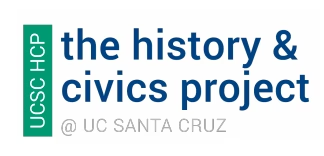
The History and Civics Project at UC Santa Cruz
Last updated on January 17, 2025
Grant awarded by
Region
Organization Type
Congressional District(s)
Fiscal Year Of First Grant
Contributing Organization(s)
Organization description
We are the newest California History-Social Science Subject Matter Project, founded in the summer of 2018. As a community of teachers, scholars, and students, we are dedicated to supporting K-12 educators in their daily efforts to facilitate and challenge students in becoming literate, knowledgeable and engaged citizens.
Content, Inquiry, Literacy and Civics
High quality history and civics education is vital to building a more just society and preparing all students to be literate, knowledgeable, and engaged citizens.
In California, the new Framework for History-Social Science outlines a focus on integrating more student inquiry into California’s K-12 classrooms. Calling for instructional shifts that embed deep learning of content, disciplinary literacy, and civics, the Framework offers an opportunity to restructure and revision teaching practice, curricula, and assessment.
As the newest regional site for the California History-Social Science Project [CHSSP], The History & Civics Project at UC Santa Cruz provides programs, support, resources, and technical assistance to educators, schools, and districts to support these shifts. Ultimately, we aim to support the region’s educators, schools, and districts in offering engaging, challenging, and significant history and civics curriculum and instruction for all of their students.
The California History-Social Science Project [CHSSP] is one of nine discipline-based statewide subject-matter projects that support on-going high-quality professional support for California’s teachers. The subject matter projects build and support sustainable teacher learning communities.
At the core of the CHSSP’s work are the vital subjects of history, civics, and the social sciences. This statewide network of scholars and K-12 teachers is dedicated to providing the highest quality history instruction, with a special focus on meeting the needs of English learners and emergent bilinguals, native speakers with low literacy, and students from economically disadvantaged communities.
Project description
TPS project focus
- Curriculum
- Teaching Materials
- Webinars
- Workshops
Content focus
- Art
- Civics
- Cultural Studies
- English Language Arts
- Gender Studies
- Geography
- History
- Information Literacy
- Library/Media Studies
- Literacy
- Math
- Science
- Technology
- Civil Rights
- Civil War
Audience
- Artists
- Classroom teachers
- Community members
- Curriculum coordinators
- Librarians/Media specialists
- Researchers
- Students
- Teacher candidates/Student teachers
- University faculty
Level(s)
- 3 - 5
- 6 - 8
- 9 - 12
- Undergraduate
- Graduate
Population focus
- African Americans
- Asian Americans
- English language learners
- Hispanic/Latinx
- Incarcerated
- Jewish Americans
- Learners with disabilities
- Low income
- Native American/Indigenous
- Rural
- Urban
- Women and girls